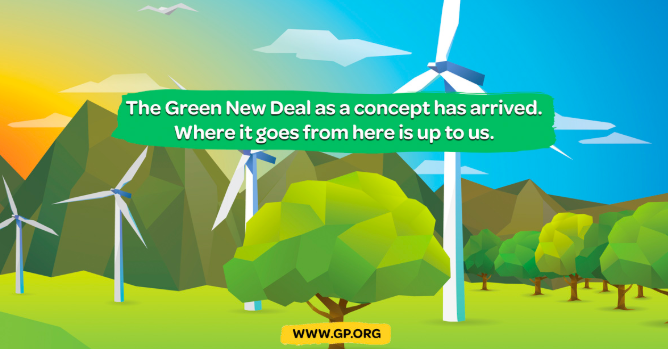
On Tuesday, moderate Democrats in the House of Representatives, led by Congressman Frank Pallone of New Jersey, announced at a press conference that they will develop a “concrete” new climate proposal as an alternative to the Green New Deal, with a goal of achieving 100 percent clean energy by 2050. While it is not clear what will be in the “concrete” proposal, the lawmakers promised to consult with stakeholders in developing it, and it is less ambitious than the Green New Deal, which sets a goal of 100 percent clean energy by 2030 in order to aggressively deal with the crisis and improve the odds that we stay within the 1.5-degree Celsius temperature increase that the IPCC recommends. The Green New Deal already has garnered 94 supporters in the House and has the support of all the leading Democratic candidates for President.
Why This Matters: A public splintering of Democrats on addressing the climate emergency is not helpful to the drafting or the passage of climate legislation. Just like with other issues, divisions will only make it easier for climate-denying Republicans and President Trump to succeed in rolling back current climate protections further. Discussion is important. Debating policy ideas is critical. Dissension and division among supporters of climate action will undermine all our efforts. As Greta Thunberg said in her speech to the French National Assembly, let’s unite behind the science (which both groups maintain supports their position), and stop talking about what we disagree about, and start drafting real proposals.
The GND Alternative
The “100 by 50” proposal will be done by the end of the year, according to the leaders behind it, and they intend to hold a number of hearings and meetings with business leaders and environmentalists in developing it.
- Representative Paul Tonko said, “We can do any kind of whimsical thing but we have to do this in a way that includes conversations with stakeholders, their buy-in and their involvement in a consensus bill.”
- Representative Tonko will be one of the lead architects of the “100 by 50” plan and will chair many of the hearings that will inform an eventual bill.
- The Sunrise Movement reacted to the news saying, “Pallone and Democratic leaders are right that this is a crisis. But by setting a goal of achieving net-zero emissions by 2050 here in the United States, they’re not acting like it.”
- But other groups supported the “100 by 50” proposal — The National Resources Defense Council said House Democrats “are setting bold goals to protect our children and grandchildren from climate catastrophe,” and the Sierra Club said that these House Democrats are “taking the 100 percent clean energy progress happening in cities and states all across the country to a national scale.”
What The Real Other Side Is Saying
Fox News, meanwhile, reported that according to a new study by the Heritage Foundation, the goal of drastically reducing greenhouse gas emissions by 2050 is practically impossible.
- The Heritage study also concluded that just “a 58 percent reduction would, by 2040, cost the economy $15 trillion in lost gross domestic product and an average of 1.1 million jobs per year. The average family of four would also see a total income loss of $165,000, or nearly $8,000 each year.”
July 24, 2019 » #GreenNewDeal, 100 by 50, climate emergency, Green New Deal, Greta Thunberg

